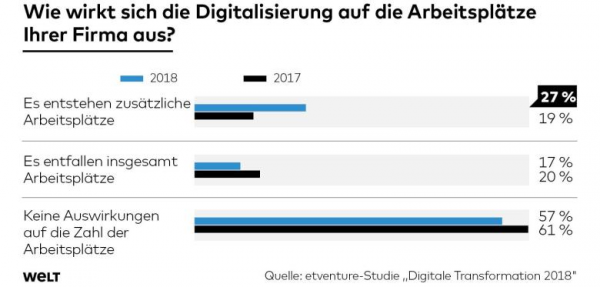Where the journey goes
Robots find their place everywhere in our everyday life. However, many people have a sinking feeling in their stomachs, because the machine "human" is more intelligent, cheaper and much more resilient. Various studies assume that up to a third of the jobs previously performed by humans will be eliminated in the foreseeable future. However, the chance to replace these jobs of equal or higher value is more than real: three major areas are ready for new and sustainable jobs. Engineers, technicians and computer experts will be needed in the coming years to develop, implement and apply digital technologies. These are the same areas that already offer great opportunities and where the demand of companies exceeds the supply of skilled workers.

According to a study by Etventure, the impact on the number of jobs remains rather unchanged. However, as the statistics show, this percentage has decreased by 4 % from 2017 to 2018. However, 8 % were added to the item "new jobs created". Here we can see that opinions and assumptions on the topic "digitisation in the workplace" are still undifferentiated.
Currently, however, WIFO is also pointing out in a study on the employment effects of digitization that a serious prediction cannot be made due to the complexity of the topic. At the same time, however, it is noted that positive effects are not sufficiently considered in many studies. Overall, WIFO also arrives at a positive overall assessment.
Useful addition
Besides, one must not forget: Robots can take on life-threatening jobs and work that are physically too strenuous and also far too dangerous for humans. Especially in the health and social sector, in entertainment and creative areas, many unattractive and poorly paid jobs can be upgraded, as they often cannot be replaced at all. Humanity is still in demand in a wide variety of professions.
And last but not least, many service-focused industries have higher demands on services, which can only be met by people and not by machines.
Conclusion
Our digital twin will therefore most certainly change our working world fundamentally. Like every technical development, the framework conditions are changing and everyone will have to deal with them in order to be successful in working life.
In sum, however, it will facilitate and enrich our life as a whole.







